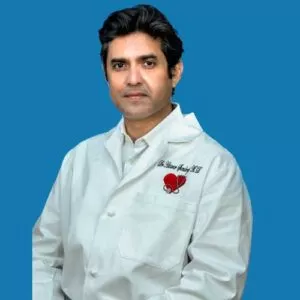The most common conditions that may require a heart transplant include:
• Cardiomyopathy — A disease of the heart muscle that weakens its pumping ability.
• Coronary artery disease — Severe blockage of arteries leading to repeated heart attacks.
• Congenital heart disease — Structural abnormalities present from birth that worsen with age.
• Severe heart valve disease — Advanced valve damage causing poor blood circulation.
• Life-threatening arrhythmias — Irregular heart rhythms unresponsive to medication or devices.
• Post-cardiac surgery failure — When previous surgeries like bypass or valve replacement fail.
• End-stage heart failure — When the heart can no longer meet the body’s demands despite treatment.
At Shinon Global, we support you through every step of the process, including transplant evaluation, hospital selection, and legal transplant approval under the THOA Act, ensuring you receive the best possible care from the best heart transplant doctor in India.
1. Orthotopic Heart Transplant
This is the standard and most common type of heart transplant, where the patient’s diseased heart is removed and replaced with a healthy donor heart in the same position. Routinely performed for patients with end-stage heart failure. Shinon facilitates orthotopic transplants at leading cardiac centers across India.
2. Heterotopic Heart Transplant
Also known as a piggyback transplant, this involves connecting the donor heart to the existing heart. It is used in cases where the original heart cannot be removed due to high pulmonary pressure or structural issues. Rare but available when medically indicated at Shinon’s partner hospitals.
3. Combined Heart and Lung Transplant
Performed when both heart and lungs are severely damaged. Ideal for congenital heart disease or advanced pulmonary hypertension. Coordinated at elite multi-specialty hospitals with dual organ expertise.
Through our accredited hospital network, patients access not only world-class cardiac expertise but also affordable heart transplant cost in India—up to 80% savings compared to the US, UK, or UAE.
For related donors, required documents:
• Valid medical visas (donor and recipient)
• Passports & photographs
• Embassy NOC and attested identity proof
• Family photo showing relation
• Birth/marriage certificates, government IDs
• ITRs and bank statements (3 years)
• All medical records from your country
Additional documents for unrelated donors:
• NOC from donor’s family
• Proof related donors are unfit
• Verified family tree
• Physical presence of donor’s family during approval
• Magistrate-attested affidavits with photos
Note: The donor must be at least 18 years old and a clinical match.
Our transplant coordinators handle all paperwork, embassy formalities, and legal compliance so you can focus on recovery.
| Country | Approximate Cost per Transplant (USD) |
|---|---|
| India | USD 45,000 – 70,000 (all-inclusive packages) |
| USA | USD 120,000 – 300,000 (without insurance) |
| Singapore | USD 90,000 – 150,000 |
| UK | USD 100,000 – 250,000 |
| Thailand | USD 70,000 – 90,000 |
Shinon helps patients access affordable transplants in India with transparent pricing and comprehensive care.
Here’s why patients choose us:
• Partnerships with top JCI & NABH-accredited transplant hospitals
• Access to India’s best heart transplant doctors with decades of experience
• 5,000+ transplants successfully coordinated
• Personalized surgeon and hospital selection based on your reports
• Complete support for donor matching, THOA documentation, and scheduling
• Post-op care including rehab planning, medication guidance, and travel coordination
With Shinon Global, you get trusted, compassionate care centered around your health, safety, and recovery—whether you’re seeking a transplant in Mumbai, Delhi, or another major city.
Revocery for a heart transplant patient may take years.













